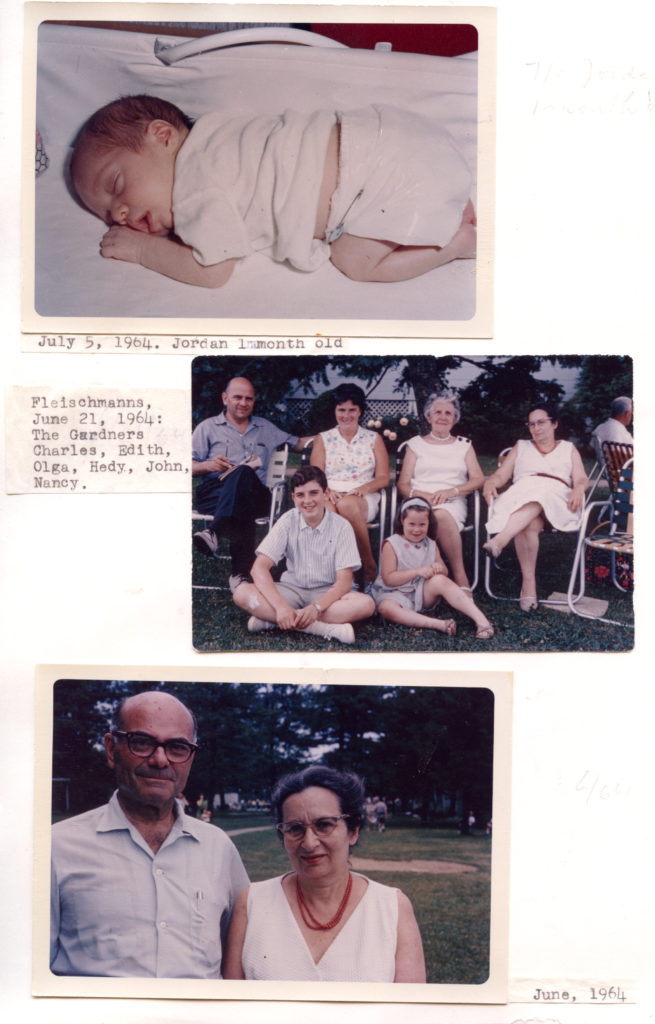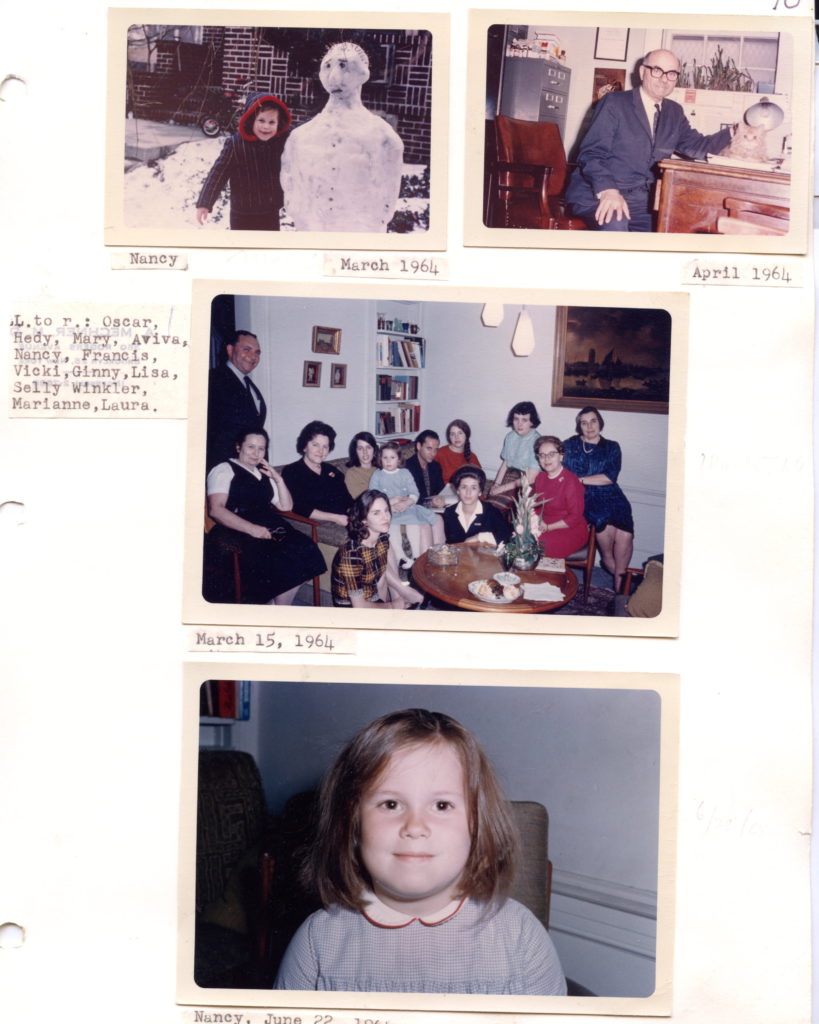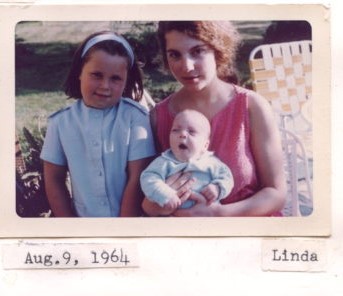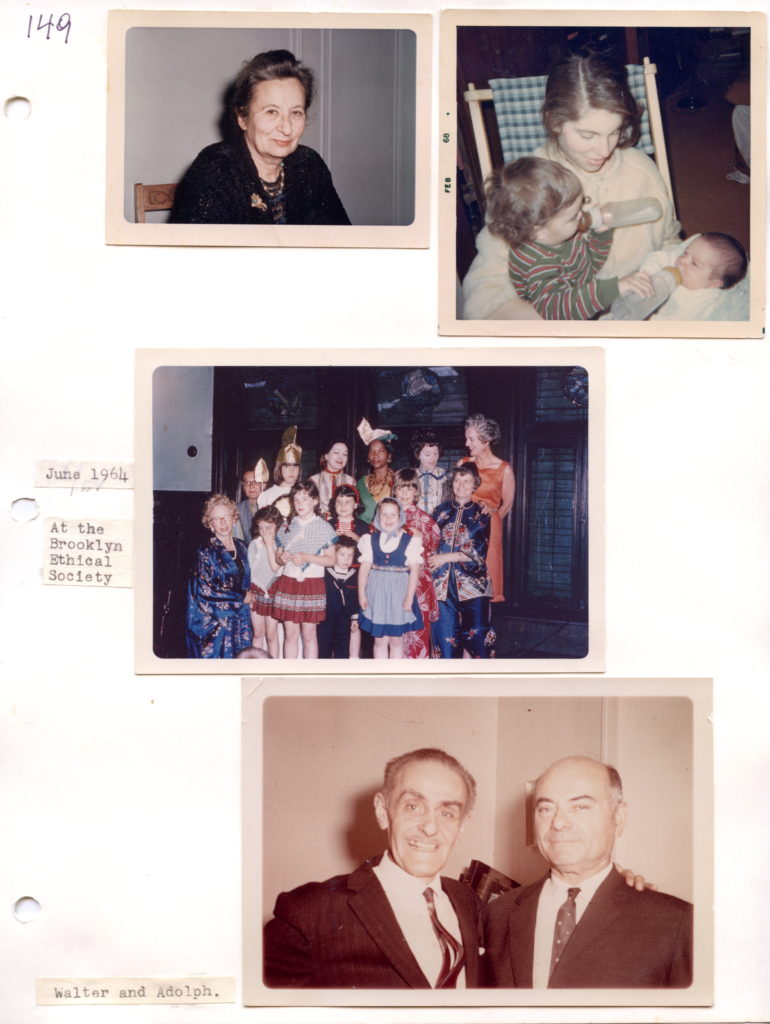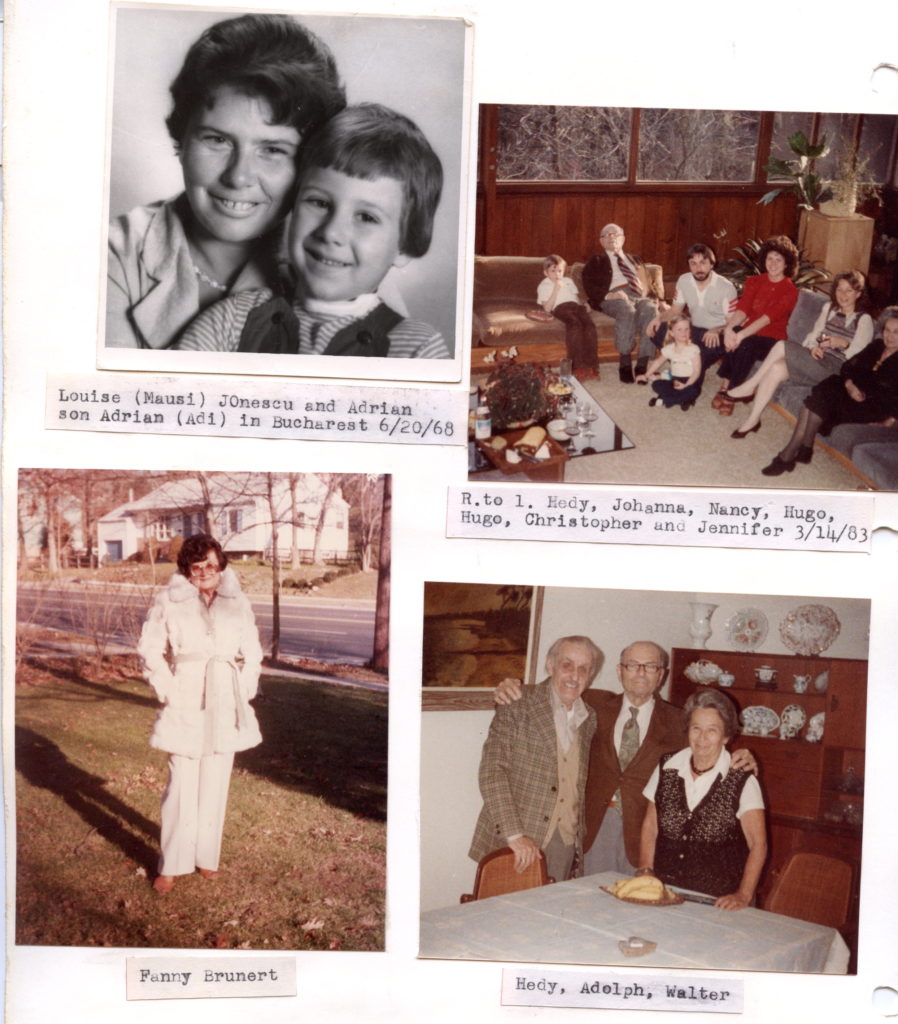1963-1964
I did not mention for a long time my half-brother Walter in my narration. The last time I mentioned him was when I described the situation of my family in Rumania and explained that when the house was torn down and the new house constructed, my family received 5 apartments, one for my mother and the other 4 for us 4 children, which were later sold. Walter was the first to sell his apartment, since he had planned to emigrate to South-America and he needed the money to pay for the journey.
I was then over the years in contact with him by mail, at times in closer, at other times in less close contact, with long intervals. An interview, with his detailed description of his life in Argentina, is attached to this biography and makes interesting reading. To make the gap here less wide, I will mention here some important facts, so for instance that he married Fanny in the year 1945 on January l7th, in Montevideo, Uruguay and that their son Hugo was born on October 26th, 1950.
Walter had a difficult struggle in Argentina, had tried over the years in different ways to make a living, and Fanny worked also hard to contribute her share to the earnings. For many years, Walter had there a photo studio and in addition was tutoring pupils in the evening hours in Spanish and German, since he had a special talent for languages, and Fanny worked in a catering business and in addition to that as a seamstress, also on account of a special talent for that kind of work.
Still, they were not satisfied, had a difficult struggle on account of the economic situation and the constantly worsening inflation in Argentina.
One day, I received from Walter a very long letter, in which he explained their precarious situation and in which he asked me, whether I could help him to immigrate to the U.S. My answer was that I will gladly do all I can to bring that about. I saw many difficulties, in the first place the language difficulty and in the second place the difficulty with the Rumanian quota. I went on one of the next days to the Immigration Department, where I had to stand in line for a long time till I got to the front and received forms to fill out. I took them home, studied them, and brought them back a few days later. I had very little hope, since there was the difficulty with the Rumanian quota.
But to my astonishment that difficulty disappeared suddenly, when I was told that Walter, having been born in Czernowitz, which was now in Russia, belonged to the Russian quota. The Russian quota was quite big, a few thousand per year, and was open, that means now available for new immigrants. I was really happy.
An enormous job began now for me. I had to prepare an affidavit, which required great many documents, in the first place proof that he was my half-brother, and for that I needed his birth certificate, which would show that we had the same mother, his father’s death certificate, which I happened to have, proof that I had money in the bank and stocks and bonds, etc. I also had to approach a friend of mine, a Mr. Sabin, who had a big metal factory, and ask him to write a letter, in which he would declare that he will hire Walter as an employee in his business.
All that required much work for me as well as for Walter in Argentina and caused much delay, and it took almost a year till he finally got the immigration visas for himself, Fanny, and Hugo.
That was by far not all I had to do. There arose the enormously difficult task for me to find an apartment. Although Walter would have to travel every day to his job at the Sabin Metal Company in Meserole Street in Brooklyn, I found out by studying the street plan that he could live in Manhattan in a relatively good section, from which he would have an easy direct subway connection to Brooklyn. That was the Chelsea area in Manhattan. It cost me much time and effort to find an apartment there, going from house to house and talking to superintendents of many houses there.
We had decided that they should come at the end of September 1964. I found an apartment on West 24th Street near 7th Avenue, which would be empty in September and promised the superintendent there that he will get some money from me, if he would hold the apartment for me.
We went then for the summer again to Massapequa and during these two months I called the super in Manhattan a few times to remind him that I was still counting with that apartment. I had sent Walter a German-English grammar, and begged him to learn English.
As soon as the summer vacation was over I started to collect old furniture. I had some nice pieces in the attic, which the Freudenthals had given me a few years back, before they moved from Brooklyn to Massapequa, a chest of drawers, 2 beds, chairs, a big table. I went also again to Massapequa to pick up a few more things from the Freudenthals. I don’t remember the details anymore. I accumulated a great number of furniture in my garage, as much as I could, and one day, when the apartment in Manhattan was empty and I had paid the rent already for the month of September and given an extra amount of money to the super and had the key to the apartment, I rented a U-Haul-truck and loaded all the furniture into that truck. Perhaps somebody helped me in Brooklyn with that, and Nancy helped a little too. She was then 6 years old. I took Nancy along to Manhattan and she was very helpful in taking the things down from the truck and pushing them to the elevator, one by one, and up there from the elevator into the apartment. I know that nobody had helped me there, only Nancy.
During the next few days I took some more things there in my car, some small carpets, blankets for the beds, paintings for the walls, pots and pans, dishes and cups. It was at the end a completely furnished apartment, consisting of one bedroom, one living room, a kitchen, and a bathroom.
Walter and Hugo arrived on September 27th, 1964. Fanny did not come along with them, had to stay behind in Argentina for many different reasons. I picked them up, of course, at the airport. We had there right away two serious complications. When Walters baggage had to be inspected, he could not open one of the valises. It turned out that the valise did not belong to him. It so happened that there was another person on that plane, who had exactly the same valise as he. That person had already left the airport. There was nothing else that could be done than to take that valise along and wait at home till that other person, who had Walter’s valise, would call up at the airport, and gave the name and the address, so that the valises could be exchanged and that was exactly what happened. The next day I had to go with Walter quite far to Queens for the exchange of the valises.
The other serious complication at the airport was that we were sent to a police station at the airport to report that incident. We had to wait at first for a certain bus to take us there and Walter had put a heavy briefcase, filled with documents, the passports, and all kind of papers down on the sidewalk. When we finally left with that bus, Walter noticed that he had left his briefcase standing on the sidewalk. It took quite a while to drive around and to come back to that spot, where he had left the briefcase, which, of course, was not standing there anymore. We were sent to a lost-and-found-station and, luckily, there was the briefcase.
Now, finally, we could go to Brooklyn for dinner. Johanna was also there. Later in the evening, I drove Walter, Hugo, Johanna, and perhaps also Nancy to Manhattan, to Walter’s and Hugo’s apartment. I remember, how they all were amazed, especially Johanna, when they saw the completely furnished apartment. They could not stop wondering how I managed to do all that.
Walter did not look good at all when he arrived here. He said that he was sick with a cold before he left Buenos Aires. But that could not have been the reason that he was skinny, had deeply sunken-in eyes and sunken-in cheeks. He was only 54 years old, but looked like an old man. When I introduced him, two days later, to Mr. Sabin, he was astonished when he saw him, he used a word like emaciated, and the very few words that Walter spoke also did not help to improve the first impression.
Walter was supposed to work there as a kind of supervisor and he gradually became acquainted and adjusted to that kind of job. He is certainly very intelligent and learned soon his obligations, and friendliness helped also.
Hugo was a lovely boy, was put in a high school on West 18th Street and adjusted gradually to that kind of school. Fanny arrived about 4 months later on January 11th, 1965, and started soon to work at the same place where Lisa worked.
It was their start in this country and it was a relatively good start. By the way, when they immigrated, Walter and Hugo changed their names from Brunwasser to Brunert, and Fanny kept for a certain reason the name Brunwasser, changed it later also to Brunert.
The year 1964 was important on account of another event too, the arrival of Jordan on June 4th, Francis’ and Vicki’s first child and our first grandson, our second grandchild. Nancy was No.1. There was now finally a male Mechner in the family, to carry the name a little further into the future. I should mention here that Carl had also a grandson, born one year earlier on August 27th, 1963 in Bucharest. His name was Adrian Jonescu, and he was and is called Adi, and he has a sister Monica, born 11 years earlier on July 12th, 1954.
For a while things looked good with Walter. But it turned out that he was not satisfied with his job. He had expected something better in the U.S. In Argentina he had worked very little in his photo studio and here he was supposed to work hard. He had not enough ambition for that kind of job. He was a chain smoker and that was his greatest handicap. He had all the time a cigarette in his hand, and with one hand one could not work in this country and make a living. Mr. Sabin saw it. He had a kind of television on his desk and could see there every corner of his factory and knew what everybody was doing. And he saw all the time Walter standing, with a cigarette in his hand and looking at the workers. He was paying Walter 100 dollars a week right from the beginning, and that was not a bad salary at that time. He mentioned to me that he was dissatisfied and that he let things go like that on account of me. I was for many years his family doctor and his friend and he had many reasons to be grateful to me. He finally had the idea of taking Walter into his office and letting him do office work. He let him organize his filing cabinets and Walter did a good job with that. And then, when Mr. Sabin learned that Walter was a photographer in Argentina, he asked him to take pictures of all the machinery and of every corner of the factory, and Walter did a fine job with that too and presented at the end a nice album to Mr. Sabin.
But one day Walter quit. He found it degrading to continue working there and Mr. Sabin accepted his resignation. Walter had the idea that he could do a good job as a language teacher and was looking all the time for a job, searching the ads in the newspapers, and he went to some places, which had offered a job, but did not find what he was looking for. In the meantime, he lived on unemployment payments, and since Fanny had a relatively good job, working at the same place where Lisa worked, they could live on that.
Walter found one day an ad in the New York Times, offering a position of a teacher for Spanish in a Long Island junior high school. It was in the summer of 1965, shortly before our vacation in Massapequa. He asked me to make a telephone call to that school for him, since his English was not yet good enough, which I did, and I arranged for him an interview. He had to prepare a curriculum vitae, which was quite a difficult job, and Francis helped him prepare it and he sent it in by mail. They never received it, since he addressed it incorrectly.
One day, when we were already in Massapequa and Walter was there also, I made a telephone call to the school in Commack and they asked me to bring Walter over right away. He had a copy of the curriculum vitae with him and we went there for the interview with the head of the department, Mr. Stone. I remained then outside, had to wait very, very long, used the time for catching beetles, which were plentiful there.
When they finally came out, Walter and Mr. Stone, they were both smiling and behaved like old good friends. Walter had a way of being charming and apparently made a good Impression. Things looked quite good and it seemed that Walter had gotten the job. A few days later, he had to go there for an interview with the principal and he was definitely accepted. He had really hit the jackpot.
There arose, of course, right away the problem of how to get to the school from Manhattan. It was obvious that he would have to give up his apartment in Manhattan and move to Long Island. One day, I took him and Fanny out to look for an apartment. Driving forth and back, we finally got something suitable in Kings Park, which is very close to Commack. But still, without a car it would not be possible, and it was obvious that he would have to buy a car. But, at first, a driver’s license was necessary. Walter had a car, way back, in Argentina, an Opel, and so we assumed that that would not be a problem. But it was a problem. I started to give him driving lessons and he had to learn from the start, because he seemed to have forgotten how to drive. Almost every evening I went out with him in Manhattan and let him drive. He took a driver’s test, but failed. I took him out again and we drove a lot around, and when he took the test again, he failed again. That became now a serious problem, because the time, when he had to start in school, came nearer and nearer. Finally, he took the test again for the third time and this time he passed. He bought now a second hand car, and a new life started for all of them. Hugo had also a nice school out there nearby. Things began to run smoothly.
The start in school was also good, although Walter had to learn a new system how to teach, an audio-visual method with a tape-recorder. He also managed to keep discipline in his class and so, everything seemed to be fine. But no, it was not. They were not satisfied with their apartment, were thinking first of renting a bigger apartment, but figured it out that they could just as well buy a house and use almost the same amount they paid for rent for paying mortgage. They found a house, where very little money was needed for a down payment and they bought that house, quite near the place, where they had lived, and even nearer to Walter’s school. It was an excellent buy and they have now a nice house, had improved it in many ways and it has risen very much in value.
